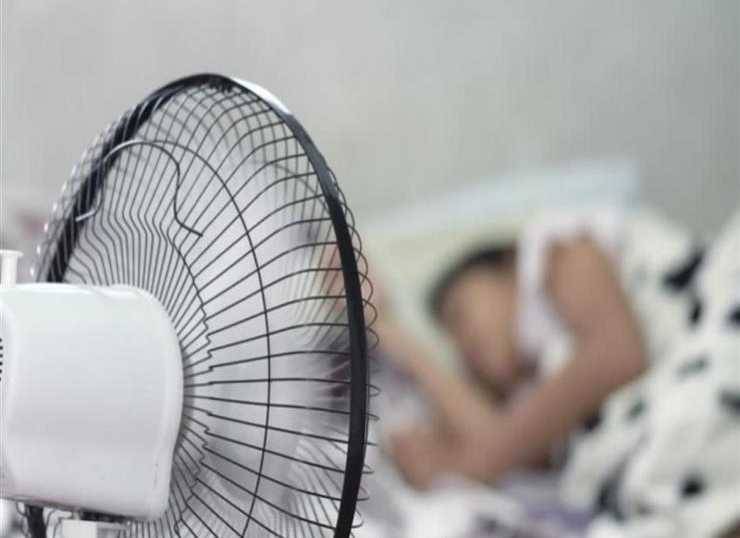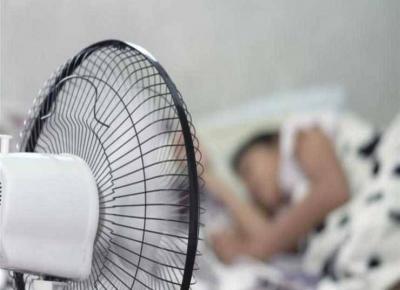Sleeping in front of a fan is a part of many people's nighttime routine to combat rising temperatures during the summer. Although the cool breeze from the fan helps maintain calm and comfort at night, sleeping with a fan can be harmful to health. A recent study found that as temperatures rise, the average sleep duration drops to less than seven hours per day. Here are the main risks associated with sleeping in front of a fan:
**Worsens Allergies or Asthma**
Dr. Raj C. Dhiadia, Associate Professor of Otolaryngology, Sleep Medicine at the Perelman School of Medicine at the University of Pennsylvania, explained to the "Lifestrong" medical site that the fan stirs up dust and allergens present in the room, or even pet dander, leading to exacerbation of allergies and asthma for those affected by these conditions.
**Decreases Indoor Air Quality**
The combination of opening a window and running a fan at night may seem like a smart strategy for a peaceful sleep, but it can be more harmful than beneficial. According to Sam Ho, Head of the Otolaryngology Department at Mount Sinai Hospital in Brooklyn, "If you live in an urban environment, where there are many diesel particle emissions, the fan can circulate outdoor air pollutants inside, directing them straight to the upper airway of the sleeper." These pollutants can lead to deteriorating indoor air quality. The American Lung Association pointed out that poor indoor air quality can cause or contribute to lung cancer and chronic lung diseases like asthma.
**Causes Congestion**
Ho clarified that a direct stream of air toward the sleeper can draw moisture from the body and dry out the mucous membranes. Once the sleeper's nose is irritated, it overproduces mucus, as the mucous glands work extra to compensate and cover all the dry spots in the nasal passages. This can lead to swelling of the mucous membranes and nasal congestion. Dr. Lama Takla, an ear, nose, and throat specialist, previously advised those suffering from nasal congestion to stay away from irritants like household dust or pet dander and to use saline nasal sprays in the morning and evening.
**Increases Susceptibility to Illness**
When mucous membranes dry out and without an adequate amount of mucus, a person becomes more susceptible to illness. Ho explained, "Mucus provides a protective layer, so that no type of irritant or microorganism can penetrate it. But once it dries out, the mucous membrane becomes more permeable and it's easier to catch a cold." He added that drying out of the mucous membranes leads to cracks in the nose. These small openings in the skin can become gateways for bacteria, causing further infections and nosebleeds.
**Spreads Germs**
Ho clarified that sleeping with a fan not only weakens the sleeper's nasal defenses against potential infections but can also spread germs present in the room. If you share a bedroom with someone who has a cold, the fan will blow some viral particles your way. In other words, the fan's airflow can create a steady stream of germs and viruses directed at you while you sleep.
**Dries Skin**
The airflow from the fan dries out mucous membranes as well as the skin, especially in a dry indoor climate. Dhiadia stated that the fan pulls moisture from the sleeper's skin, which can leave them feeling a bit parched. When a person sleeps, they are essentially fasting (not consuming water), thus using the fan contributes to increased fluid and moisture loss.
**To mitigate the negative effects of sleeping with a fan, doctors recommend the following:**
- Maintain a healthy home through daily cleaning.
- Place a bowl of water in front of the fan to add moisture to the air.
- Point the fan toward the lower part of the body.
- Position the fan at least three to six feet away from the face.
- Reduce the fan's speed.
- Use a humidifier.
- Close the window.
- Use an air conditioner.
- Opt for light clothing instead of a fan.




